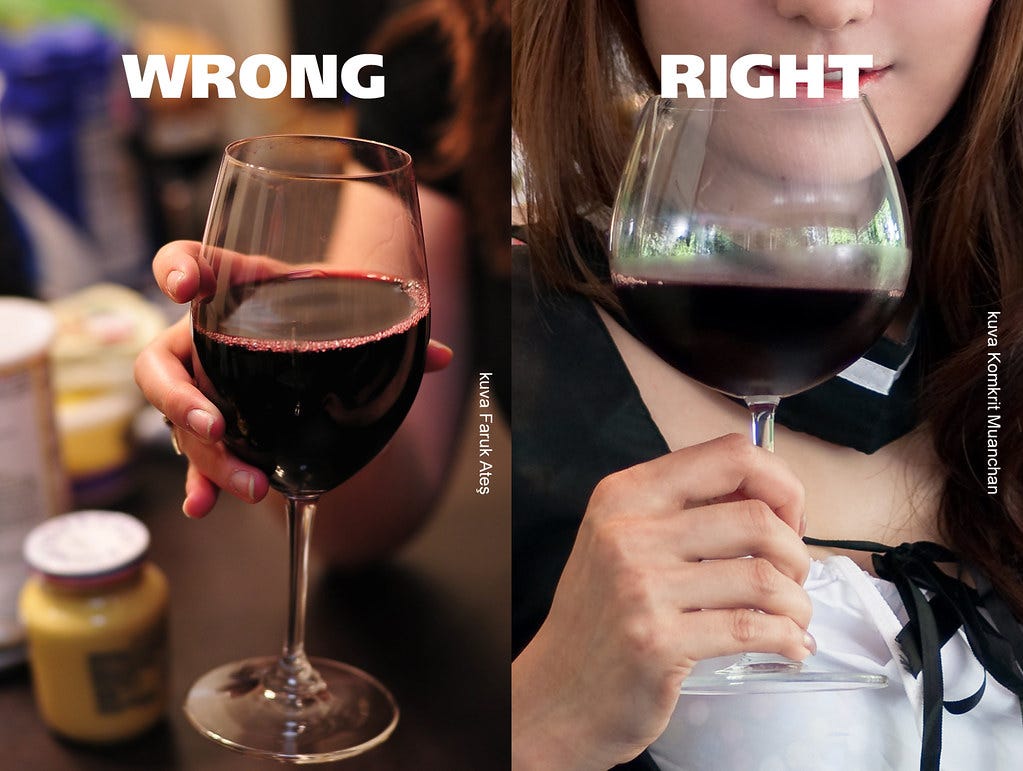Why do people like working with their hands? Activities like woodworking, cooking, gardening, knitting, or fixing a motorcycle can produce a pleasant state of mind: relaxed, free from worry, yet focused and productive. That’s how I feel when I play pool or hit golf balls at the driving range. I like to do it everyday, and if I miss out for a few days I feel a little bit edgy. Why would that be?
I found several articles online proposing that manual work is good for metal health because it can calm down an overactive mind. Maybe you stop engaging with regrets about the past, or worries about the future, and this allows you to live in the present. I think this is partly true - part of the mind that engages in a lot of useless chattering does seem to turn off when you work with your hands, and that's a good thing. But I also think this explanation leaves something out: the chattering mind turns off because there's another part of the mind that turns on, and its one that is left off in the off position far too often. It’s the part that controls the body and especially the hands. Because in human beings there is a close connection between hands and minds.
Cognition and action
Thinking and doing are often considered to be very different things, almost opposites. Thinking happens in an abstract realm of concepts, and doing happens in the concrete world of objects. But these functions are interrelated, because our cognitive skills are built on a foundation of physical skills.
Coordinated movement requires a lot of brain power, and our brains have been evolving for billions of years to get better at it. Our higher level cognitive abilities didn't arise until relatively recently, and the neural systems that allow them depend on lots of support from the older systems created for movement. According to the neuroscientist Oliver Sacks:
Much more of the brain is devoted to movement than to language. Language is only a little thing sitting on top of this huge ocean of movement.
The connection between thinking and doing is most obvious as applied to the hands.
Grasping concepts
The Latin root for the word “concept” is derived from words meaning "take in" or "seize with the hand." We can see the connection in English as well, because we talk about the ability to “grasp” concepts. But grasping objects comes first, and this is true on both evolutionary and developmental timescales.
Manual dexterity emerged in our primate ancestors as a way grab tree branches, pick fruits, turn them in their hands to assess ripeness, and eventually start making simple tools. Primate intelligence is partly explained by the fact that these activities require a sophisticated brain. Here's a quote from the neurologist Frank Wilson in his book The Hand: How It Shapes the Brain, Language and Culture:
Since it does not seem likely that the brain's remarkable capacity to control refined movements of the hand would have predated the hand's biomechanical capacity to carry out those movements, we are left with a rather startling but inescapable conclusion: it was the biomechanics of the modern hand that set the stage for the creation of neurologic machinery needed to support a host of behaviors centered on the skilled use of the hand. If the hand did not literally build the brain, it almost certainly provided the structural template around which an ancient brain built both a new system for hand control and a new bodily domain of experience, cognition, and imaginative life.
The same developmental sequence is seen in infants – they manipulate objects before concepts, and play with blocks before ideas. In some sense there's no difference: work by the hands implies work by the mind. The philosophers Rene Descartes and Immanuel Kant both considered the hand to be the outer brain. Anaxagoras said that humans became intelligent creatures because of their hands.
Manual skills and large brains
Why does it takes so much brain power to operate the hands? Handling an object with skill requires constant exploration and experimentation: a finger reaches out to make contact, it gets sensory feedback, the brain interprets its meaning, forms a detailed map of relevant details about the object, and then immediately adjusts the movement of the finger to commence a slightly different experiment, and so on. The movements of each individual finger need to coordinated with the others, which are all engaged in their own semi-independent activities.
(Side note on octopuses: their amazing intelligence may have something to do with the high levels of dexterity in their “hands.” Two thirds of their neurons are located in the arms, causing scientists to speculate that they have nine brains.)
The extreme difficulty of coordinating a hand can be seen by looking at robotics. Although robots can now walk over varied terrain with reasonable skill, progress is far slower in developing a generalized manual dexterity. This is why we have robots that can vacuum the floor, but not unload the dishwasher. That would require mastery of an enormous "vocabulary" of different potential hand configurations and movements. We take for granted our ability to grasp and manipulate wine glasses, pens, balls and hammers, but each movement requires a different technique.
In more complex manual tasks like knitting or woodworking, you need to string together long sequences of different hand movements in the right combinations, at the right times and rhythms. It’s almost like speaking a language. Indeed, human hand movement is just as complex as spoken language, and hand signs probably preceded spoken language as a means of communication. Scientists who study infant development find many close links between the development of hand skills, manual gestures and language.
Elementary schools traditionally provide plenty of “hands-on” education. Part of the rationale for hand-writing and drawing is that it promotes general cognitive development. In my child's school, kids who struggle with math are given blocks or other "manipulatives" to give them a concrete sense of arithmetic. They grasp objects to help them grasp concepts.
Studies on crafting and flow
There is research (most of it observational) reporting that people who engage in crafty activities like knitting or quilting find that it lowers stress, reduces pain and anxiety, and creates a general sense of well-being. This is especially true in group settings. Here's a quote from someone who likes to whittle, which is representative of the claims made in the research:
I find myself focused on the task in front of me, am able to be with the tools and the wood, being mindful on what I am doing in the moment ... It really is a here-and-now activity. You have to concentrate on what you are doing … it feels like worries, stress, and pressure can be released focusing on something outside of ourselves. The physical aspect allows for tension to be released, the focus required on the task takes you away from problems ...
This sounds like a description of a flow state, a concept developed by the psychologist Mihali Csíkszentmihályi. Flow is an experience of intense and rewarding focus on an intrinsically motivating activity. It is widely considered by psychologists to be a key ingredient in a good and meaningful life. Flow has the following characteristics:
strong focus on the activity
sense of control over the activity
sense of merging with the activity
reduced self-consciousness and awareness of time
high level of intrinsic motivation and reward
All of these qualities can exist on a spectrum, so you don't need to be having some kind of mystical experience to get the benefits.
What kinds of activities generate flow? Classic examples would be surfing, rock climbing or dancing. But flow can be found in almost any activity under the right circumstances. The following factors make it more likely:
clear goals
lots of feedback
optimal level of challenge (not hard enough to be overly frustrating, not so easy that concentration isn’t needed)
you care about what you are doing (so its rewarding and motivating)
you are skilled at the activity (this makes it more likely to feel a sense of control, merging with the activity, and high levels of reward)
It’s easy to see how these factors would be present while you are working with your hands in executing complex skills. So if you have hand skills, remember that using them on projects you care about is a way to generate beneficial and healthy states of mind.
In our heads
Modern humans are directing their attention more and more to imaginary or virtual worlds, and less to the physical world surrounding us. This is not all bad - abstract thinking can generate ideas which eventually make the physical world a better place. But I wonder if it's healthy for us to spend so much time in our heads, alienated from our surroundings. Hunter-gatherers surely spend some of their time analyzing what happened yesterday and worrying about tomorrow. But their attention is more likely to remain in the here and now. Most of the time, they are engaging their minds with physical tasks, like collecting food, making tools, cooking, craftwork, etc.
There are many different therapeutic and religious practices that emphasize the importance of staying present and mindful. The goal of meditation is to focus on the here and now, but it's hard because just sitting is boring, and attention naturally wants to wander. If you do some work with your hands that is sufficiently complex and enjoyable, your attention is engaged automatically on a target that the brain is designed to focus on. Perhaps spending some time engaging your mind with these kinds of activities is a way to recharge the brain’s batteries.
References/resources
Auer, Arthur. Hand Movements Sculpt Intelligence. https://www.waldorflibrary.org/images/stories/Journal_Articles/RB6203.pdf
Dickie VA. Experiencing Therapy through Doing: Making Quilts. OTJR: Occupation, Participation and Health. 2011;31(4):209-215. doi:10.3928/15394492-20101222-02
Do octopuses' arms have a mind of their own? https://www.sciencedaily.com/releases/2020/11/201102120027.htm
Hamilton, Graeme 1996. A Phenomenological Study of the Therapeutic Benefits of Woodcarving. http://summit.sfu.ca/item/15910
Lamont, A., Ranaweera, N.A. Knit One, Play One: Comparing the Effects of Amateur Knitting and Amateur Music Participation on Happiness and Wellbeing. Applied Research Quality Life15, 1353–1374 (2020). https://doi.org/10.1007/s11482-019-09734-z
Riley J, Corkhill B, Morris C. The Benefits of Knitting for Personal and Social Wellbeing in Adulthood: Findings from an International Survey. British Journal of Occupational Therapy. 2013;76(2):50-57. doi:10.4276/030802213X13603244419077
Ritter H, Haschke R. Hands, Dexterity, and the Brain. In: Cheng G PhD, editor. Humanoid Robotics and Neuroscience: Science, Engineering and Society. Boca Raton (FL): CRC Press/Taylor & Francis; 2015. Chapter 3. Available from: https://www.ncbi.nlm.nih.gov/books/NBK299038/
Wikipedia on Flow. https://en.wikipedia.org/wiki/Flow_(psychology)#Mechanism
Wilson, Frank. The Hand: How Its Use Shapes the Brain, Language, and Human Culture. Vintage 2010.






thank you for putting all these pieces together, it helps me have clear talking points in communication with folks.
Love this Todd, by the way, love your quote I heard on an interview with you that you said you heard a feldy say Feldenkrais is "structured baby play" can I ask who? I want to also refer to it with my workshop. Thanks as always!